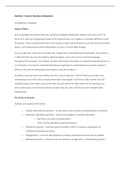Molecular phylogenetics - Study guides, Class notes & Summaries
Looking for the best study guides, study notes and summaries about Molecular phylogenetics? On this page you'll find 31 study documents about Molecular phylogenetics.
Page 3 out of 31 results
Sort by
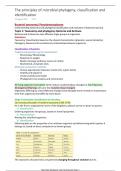
-
Principles of microbial phylogeny, classification and identification
- Class notes • 5 pages • 2024
- Available in package deal
-
- $12.09
- + learn more
Explore the principles of phylogenetics and how molecular techniques are used to establish the evolutionary history of microbes. Learn about the importance of ribosomal RNA (rRNA) sequences in constructing phylogenetic trees. Understand the classification system from domain to species, including the criteria used to categorize bacteria, archaea, fungi, protozoa, and viruses. Gain insight into the physical and biochemical traits that aid in microbial identification, such as cell shape, size...
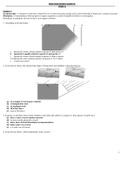
-
BIOL 3040 STUDY GUIDE II, PART A
- Exam (elaborations) • 18 pages • 2022
-
- $15.49
- + learn more
BIOL 3040 STUDY GUIDE II, PART A Chapter 4 Synapomorphy: A character or trait that is shared by two or more taxonomic groups and is derived through evolution by a common ancestor. Homoplasy: Correspondence between parts or organs acquired as a result of parallel evolution or convergence. Homoplasy is analogous and can be due to convergent evolution 1. According to the tree below: a Species B is more closely related to species G than species A b Species B is equally related to specie...
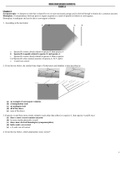
-
BIOL 3040 STUDY GUIDE II, PART A
- Exam (elaborations) • 18 pages • 2022
-
- $13.49
- + learn more
BIOL 3040 STUDY GUIDE II, PART A Chapter 4 Synapomorphy: A character or trait that is shared by two or more taxonomic groups and is derived through evolution by a common ancestor. Homoplasy: Correspondence between parts or organs acquired as a result of parallel evolution or convergence. Homoplasy is analogous and can be due to convergent evolution 1. According to the tree below: a Species B is more closely related to species G than species A b Species B is equally related to specie...
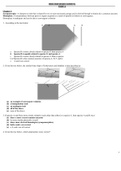
-
BIOL 3040 STUDY GUIDE II, PART A
- Exam (elaborations) • 18 pages • 2022
-
- $14.49
- + learn more
BIOL 3040 STUDY GUIDE II, PART A Chapter 4 Synapomorphy: A character or trait that is shared by two or more taxonomic groups and is derived through evolution by a common ancestor. Homoplasy: Correspondence between parts or organs acquired as a result of parallel evolution or convergence. Homoplasy is analogous and can be due to convergent evolution 1. According to the tree below: a Species B is more closely related to species G than species A b Species B is equally related to specie...
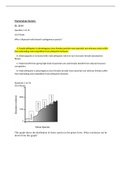
-
SCIN 401 Mammalogy Quizzes; 100% CORRECT. American Public University
- Exam (elaborations) • 36 pages • 2021
-
- $10.99
- + learn more
Mammalogy Quizzes Ch. 23-24 Question 1 of 10 10.0 Points Why is dispersal male biased in polygamous species? A. Female philopatry is advantageous since females provide more parental care whereas males suffer from inbreeding and competition from philopatric behavior. B. Heterozygosity is increased with male philopatry which in turn increases female reproductive fitness. C. Males benefit from giving high level of parental care and females benefit from reduced resource competition. D. Male philopat...
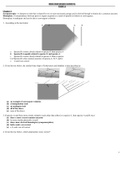
-
BIOL 3040 STUDY GUIDE II, PART A
- Exam (elaborations) • 18 pages • 2021
-
- $16.49
- + learn more
BIOL 3040 STUDY GUIDE II, PART A Chapter 4 Synapomorphy: A character or trait that is shared by two or more taxonomic groups and is derived through evolution by a common ancestor. Homoplasy: Correspondence between parts or organs acquired as a result of parallel evolution or convergence. Homoplasy is analogous and can be due to convergent evolution 1. According to the tree below: a Species B is more closely related to species G than species A b Species B is equally related to specie...
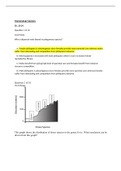
-
Mammalogy Quizzes SCIN401/ Question And Answer With Rationale
- Exam (elaborations) • 36 pages • 2021
-
- $15.99
- + learn more
Mammalogy Quizzes Ch. 23-24 Question 1 of 10 10.0 Points Why is dispersal male biased in polygamous species? A. Female philopatry is advantageous since females provide more parental care whereas males suffer from inbreeding and competition from philopatric behavior. B. Heterozygosity is increased with male philopatry which in turn increases female reproductive fitness. C. Males benefit from giving high level of parental care and females benefit from reduced resource competition. D. Male philopat...
This chapter contains information that helps us understand everything else, so it is important. You need to understand the basics of genetics to understand how evolution happens.
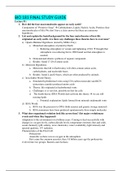
-
BIO 181 FINAL STUDY GUIDE, Latest complete guide (fall 2019/2020)
- Other • 82 pages • 2021
-
- $12.49
- + learn more
BIO 181 FINAL STUDY GUIDE Lecture #1: 1. How did the four macromolecules appear on early earth? Components of “Primitive Soup” Carbohydrates, Lipids, Nucleic Acids, Proteins (four macromolecules of life) We don’t have a clear answer but there are numerous hypotheses. 2. List and explain the basis/ background for the four main theories of how life originated on early earth. Are there any challenges these theories have to overcome? a) Oparin-Haldane Hypothesis (tested by Miller-Urey) a. ...
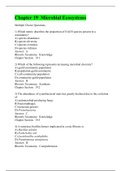
-
Chapter 19 Microbial Ecosystems,100% CORRECT
- Exam (elaborations) • 18 pages • 2021
-
- $17.49
- + learn more
Which metric describes the proportion of EACH species present in a community? A) species abundance B) species diversity C) species evenness D) species richness 2) Which of the following represents increasing microbial diversity? A) guild-community-population B) population-guild-community C) cell-community-population D) community-guild-population 3) The abundance of cyanobacterial mats has greatly declined due to the evolution of A) antimicrobial-producing fungi. B) bacteriophages...

$6.50 for your textbook summary multiplied by 100 fellow students... Do the math: that's a lot of money! Don't be a thief of your own wallet and start uploading yours now. Discover all about earning on Stuvia



